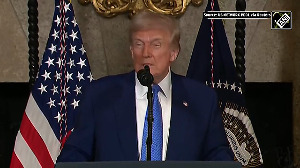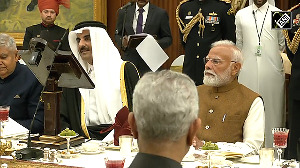In his convocation address to the IIM Ahmedabad on April 3, Bimal Jalan has drawn on his 40-odd years experience to analyse the interaction between economics, politics and governance.
As a preliminary conclusion -- and I am confident it is only an initial opening to a planned book -- Jalan points out that "India has been fortunate in having top economists to advise the government in the process of planning and economic policy formulation.
"On the political side we can rightfully take pride in our vibrant and functioning democracy... and...in respect of governance, the administrative structure of India with the so-called steel frame of a permanent bureaucracy has been the envy of the post-colonial developing world even after allowing for a considerable weakening of the frame the governance structure remains largely intact."
Having outlined the overall background Jalan poses the crucial problem: "The question which puzzles me is why this combination of economics, politics, and civil service did not lead to the kind of results that the people of our country could have legitimately expected."
He elaborates on the question by invoking the economist A H Hanson's dilemma about India, "Men are able, the organisation is adequate, the procedures are intelligently devised. Why then have the Plans since 1956 so persistently run in crisis?" As Jalan points out, "This question was asked in 1963. Many of us are probably still asking the same question."
It is of course right to continue to ask these questions; for although we are now in a much more optimistic framework, and hopefully unlikely to run into the sort of crises that we suffered earlier, yet there are certain aspects of our economic and political attitudes that are still of great concern.
In this context Hanson's answer to his own question is relevant. Jalan tells us that Hanson's main concern was "not with the theory of planning but with the unrealistic assumptions about the way people and societies were likely to respond. Too many of the government's assumptions about economic behaviour were simply unrealistic and differed from the way in which people acted in their own or their group's interests".
Although Jalan makes this point admirably he does not weave it into the making of economic policy by professional economists who served the government.
For example an unrealistic and over-valued exchange rate persisted for 40 years. The evidence of the extent of its over-valuation was prominently available to every economist whether in government or outside.
On a personal basis it was a cursory look at the unofficial markets that prompted me with no greater tools than undergraduate economics to recommend a free exchange rate and full capital convertibility in the sixties.
It seemed then as it does now that the pretence of controlling the exchange rate or the proper use of foreign exchange is just an economic mistake. With our vast diaspora it has always been unrealistic to prevent diversion of foreign exchange through legislation in times of scarcity.
The primary tool for establishing any kind of control on the exchange market is the price or the exchange rate, which can be manipulated by the authorities. If we had applied this bit of common-sense economics, we should have avoided perhaps the single greatest economic mistake since the introduction of the second Five-Year Plan.
It is common practice among economists, particularly those who have advised the government over the last forty years, to claim that politicians are sensitive about exchange rates and tend to punish advisers who recommend devaluation; the logic of that reasoning might be to float the exchange rate freely. Civil servants could not then be blamed for exchange rate movements.
But in fact a floating rate has never received the support of precisely those economic managers who are involved with exchange rate management. Indeed the attitude of government advisers to the problem of exchange rate management in the 1950s must be an enormous puzzle.
In England for example Edmund Dell writing about the history of British decisions at the time of Bretton Woods says, "The idea of freeing the British economy from its problems" (and these were formidable at the time) "by floating sterling would be a subject of debate throughout the Bretton Woods epoch. But it was never done." (History of Chancellors 1945-90).
The mystery is why it was never done. Anyone who has followed the twists and turns that the British economy has been through in the 40 years after Bretton Woods must be disappointed with the loss of that opportunity.
But that is as nothing compared to the incredible mess in men and resources that we have made by maintaining an over-valued exchange rate in the years that are covered by Jalan's lecture.
The explanation for this peculiarity of outlook lies not in the reaction of politicians to floating rates but in the psyche of economists. Space prevents the development of this argument fully but it is worth indicating the outline.
Roy Harrod writing in 1953 claimed that "free floating sterling would not be 'convertibility' at all according to the historic usage of that word. This was the condition (that is floating exchange rate) obtained in 1931-39 when sterling was deemed to be inconvertible." (Topical Comments, 1960).
In other words for convertibility to have meaning the currency has to be able to retain its value over time with perhaps only minor fluctuations. This basic concept of an unfluctuating currency was sadly embodied in the Fund Agreement, and I believe to this day influences exchange managers.
Thus for proper "convertibility", the economists' view was that it is not only necessary to make one currency changeable to another but that the value of the currency should be maintained in real terms and the nominal value should change only slowly.
Now it may be thought by us that the Bretton Wood type concept does not apply to us any longer and that is true. But it is my suspicion that the authorities who decide upon these issues are unable to convince themselves about the character of floating rates and as a consequence draw all sorts of internal restrictions in exchange management.
In his admirable convocation address to the IMM, Ahmedabad Jalan has posed the query that in spite of good economists, a fair political system and a well-trained administration, India has not achieved the results her people might have expected and hoped for.
Harrod, who was one of the earliest advisers to the IMF expressed the view that "the amount and nature of the reserves held by countries...may appear to be a technical question but I believe, on the contrary that this is a major problem, and indeed the most important problem confronting those responsible for economic affairs in the free world". (Reforming the World's Money, Macmillan, 1965).
Harrod may well have exaggerated the relevance of handling reserves. However since our handling economic policy without reserves was abysmal, one can only hope that our handling them with bountiful reserves will be exemplary.






 © 2025
© 2025